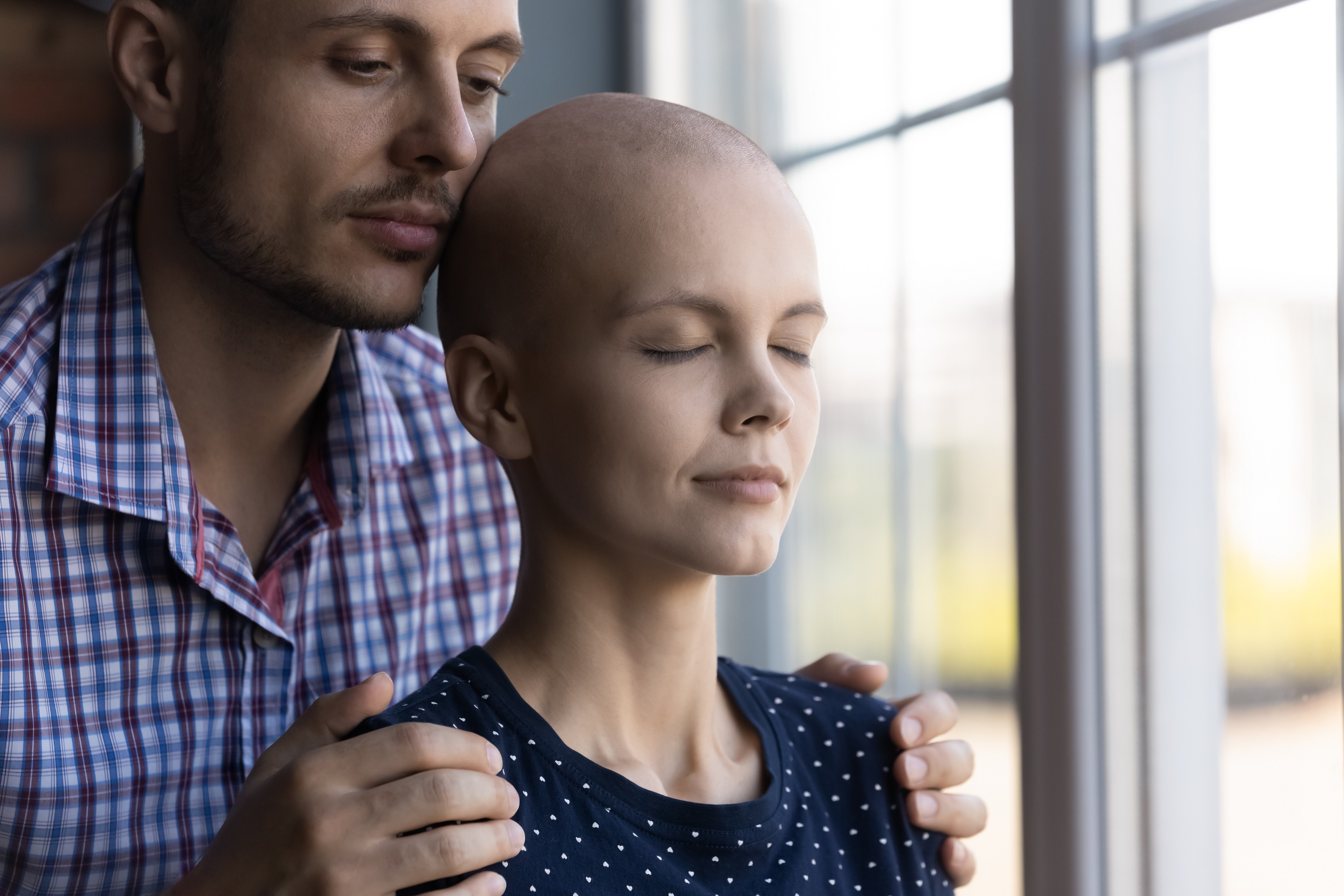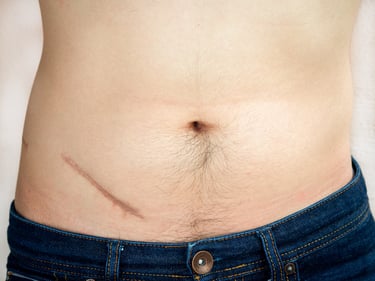Sex and Cancer
6 min read

Advice from Physician and Life Coach, Dr. Deborah Butzbach
Cancer patients often have questions about sex and cancer without many resources for information. Questions like “is it OK to have sex during cancer treatment?’ or “is there a way to improve sex during cancer treatment?” can feel awkward to bring up with a cancer doctor. Plus, they may seem “low priority” compared to the numerous, more significant subjects that patients need to discuss at doctors’ appointments. Rocky Mountain Cancer Centers (RMCC) spoke with Dr. Deborah Butzbach, an oncologist and life coach, and creator of the podcast Best Life After Cancer, to get advice on sex and cancer.
“Some people return to sex as soon as the surgeon releases them, and some people never get back to a normal sex life,” said Dr. Butzbach. “It just depends on if you’re willing to do the work.”
The “work” she’s referring to includes:
- Have an open conversation with your partner.
- Build or regain a sense of intimacy and trust with your partner.
- Do the work to feel good in your own skin.
- Do the work necessary to fix any physical issues.
- And, lastly, try having sex.
Sex and Cancer Are Not Conflicting Concepts
“A lot of people assume sex is going to be bad and so they don’t try to improve it,” Dr. Butzbach said. But, in fact, a cancer diagnosis does not automatically inflict long-term damage to a patient’s sex life. And, even if it does, there are ways to counter some of the negative impacts of cancer and cancer treatment on sex.
“The first step is to be aware of physiological changes,” Dr. Butzbach said. “Recognize that your body has changed, and the first step is to find out and address any physical issues. If it causes pain, you’re not going to like sex no matter what.”
Some of the ways cancer or cancer treatments, including surgery, chemotherapy, or radiation, may make sex uncomfortable can include:
- Pain on penetration (from surgery or radiation in the pelvis).
- Vaginal dryness.
- Side effects of cancer treatment that make patients feel unwell. These can include nausea, diarrhea, or exhaustion.
- Impotence caused by radiation to the pelvis.
Fortunately, Dr. Butzbach points out, many sources of physical discomfort during sex can be resolved or at least improved. Physical therapy can often help make sex feel less painful while lubricants and moisturizers can relieve vaginal dryness. Patients who experience impotence following recovery from radiation should talk to their urologists about potential solutions including prescription medications or a surgically-implanted penile prosthesis.
Patients in the midst of receiving chemotherapy or radiation may experience side effects that make them feel nauseous, exhausted, dizzy, or have diarrhea.
“The human body is evolutionarily based to not want sex when you’re not well (or starving) because you can’t take care of a baby,” Dr. Butzbach said. “If they’re having chronic diarrhea, feeling awful, that’s too much to ask to make sex a priority. This may be a time when partners need to take care of their own needs.”
Additionally, Dr. Butzbach counsels patients to have realistic expectations about when they’ll feel better following cancer treatment. “I think it’s really important for people to understand that you don’t feel better the moment chemo is finished,” she said.” Your body needs time to recover from all the toxins you’ve been putting into it. All this healing takes time. You’re not going to feel better next week.”
The ‘Mental Aspect’ of Sex and Cancer
Once physical sources of sexual discomfort are addressed, Dr. Butzbach says patients can begin to look at the “mental aspect.” So, what’s the “mental aspect” of sex and cancer? To generalize, the mental aspect of sex revolves around:
- A patient’s relationship with themselves – feeling sexy and having a positive self-image.
- A patient’s relationship with their partner.
 Certain surgeries, such as a mastectomy or body-changing scars, may affect a patient’s sense of “feeling sexy,” while hair loss from chemotherapy may also make a cancer patient see themselves as unattractive. In these situations, patients are more insecure about sex and intimacy, which often leads to less interest in and enjoyment of sex.
Certain surgeries, such as a mastectomy or body-changing scars, may affect a patient’s sense of “feeling sexy,” while hair loss from chemotherapy may also make a cancer patient see themselves as unattractive. In these situations, patients are more insecure about sex and intimacy, which often leads to less interest in and enjoyment of sex.
While much of the process of regaining self-confidence following cancer is a personal journey that the patient must focus on, that doesn’t mean that the patient’s partner can’t provide support and perspective. “When it comes to body image, so much of it is concern about what their partner thinks about their body. So, it’s really helpful for the spouse to provide reassurance like “I still find you attractive” or “in my eyes, you’re still beautiful.” It takes away that fear that patients have that ‘they don’t think I’m attractive anymore.’”
During cancer and treatment, the roles couples play in their relationship often change. “A lot of times one romantic partner becomes a caregiver for the other,” Dr. Butzbach said. “Cancer changes how they see themselves, how they see their roles.” This can make it difficult to then see each other as an object of sexual desire – by both partners.
Dr. Butzbach advises couples experiencing sexual problems to focus on intimacy, not sex. “Schedule time for intimacy, without distraction. Focus only on each other and have rewarding intimate time. Holding hands for a walk, having dinner without kids. If you’re not having a good connection with your partner, you’re not going to have good sex.”
In some cases, if couples are having trouble making a good connection in their relationship, couple’s counseling can be helpful.
The “last step would be to have sex and see how it goes,” Dr. Butzbach said. But, even if the “last step” is never reached, Dr. Butzbach says the value of intimacy, as an end in itself, is immense. “Human touch is so powerful. This may be a time for holding hands or cuddling, but sex is not the ultimate goal. It’s important to maintain the intimacy that allows you to get back into good sex once the illness or treatment have passed.”
Sexual Difficulties – or Changes to Sex Drive – During Cancer Treatment Are Normal
While certain cancers directly affect the physical structures involved in sex, namely cervical cancer or rectal cancer, it’s not unusual for patients undergoing treatment for any type of cancer to experience sexual difficulties or changes in their desire for sex.
“Anything that brings stress into your life can cause sexual issues,” Dr. Butzbach said. “Sex is about having fun, so if you’re wrapped up in your head it’s much harder to be open to that type of experience.”
Even without a cancer diagnosis, this is something most couples will experience at some point. Whether they’re arguing about parenting or stressed about finances, most couples notice sex is not good (or not happening at all) when they’re stressed out.
While new difficulties with sex during cancer are not uncommon, patients shouldn’t assume the problems will automatically get better once cancer is no longer a concern.
“If you’re waiting for it to magically fix itself, it’s not going to happen,” Dr. Butzbach said.
Cancer patients do not need to give up on a satisfying sex life. Many problems related to sex and cancer are due to physiological changes and often have solutions your doctor can help you uncover. Learn more about sexuality and intimacy after cancer.
 About Dr. Butbach: Dr. Deborah Butzbach is an oncologist who offers cancer life coaching. “So many people finish treatment and are like ‘ok, I’m done with cancer, done with treatment, back to work.’ But they don’t have tools and resources to get back to normal life,” Dr. Butzbach said. She also created the podcast Best Life After Cancer, to help answer the question: “Treatment is over – so, now what?”
About Dr. Butbach: Dr. Deborah Butzbach is an oncologist who offers cancer life coaching. “So many people finish treatment and are like ‘ok, I’m done with cancer, done with treatment, back to work.’ But they don’t have tools and resources to get back to normal life,” Dr. Butzbach said. She also created the podcast Best Life After Cancer, to help answer the question: “Treatment is over – so, now what?”
